Travelling by bus in Vietnam is an affordable and practical way to travel across the country and the best option to reach the most popular cities, some of which are disconnected from the railway network or have no airport nearby.
We support advance ticket booking for more than 200 bus stations and bus stops across Vietnam, including the major destinations such as Hanoi, Sapa, Ha Giang, Cao Bang, Hai Phong, Cat Ba, Ha Long and Ninh Binh in the North, Phong Nha, Hue, Da Nang, Hoi An, Quy Nhon, Nha Trang and Mui Ne in the Central Coast, Buon Ma Thuot and Da Lat in the Central Highlands, Ho Chi Minh, Vung Tau, Can Tho, Ha Tien and Rach Gia in the South.
We also list international bus routes connecting Vietnam with Cambodia.
Contents
- Bus companies in Vietnam
- Getting around Vietnam by bus
- - Northern Vietnam
- - Bus routes to Hanoi
- - Bus routes to Sapa
- - Bus routes to Ha Giang
- - Bus routes to Cao Bang
- - Bus routes to Cat Ba
- - Bus routes to Ninh Binh
- - Central Vietnam
- - Bus routes to Phong Nha
- - Bus routes to Hue
- - Bus routes to Da Nang
- - Bus routes to Hoi An
- - Bus routes to Nha Trang
- - Bus routes to Da Lat
- - Bus routes to Buon Ma Thuot
- - Southern Vietnam
- International bus routes to Vietnam
- - Cambodia
- How to book bus tickets in Vietnam?
Bus companies in Vietnam
Road transportation in Vietnam is carried out by three types of vehicles: seated buses, sleeper buses and minivans. Bus companies operate modern fleets of vehicles equipped with air-conditioning, seats or berths, and on-board amenities. Depending on the travel distance and the level of comfort your prefer, you can choose among bus, minibus or minivan available for your route.

Seated buses
Seated buses generally cover long distances during daytime and connect two or more cities in different provinces.
The most common models of seating buses in Vietnam are single-deck coaches equipped with reclining seats. Large buses have capacity for 30 to 40 passengers, whereas minibuses can carry between 15 to 30 passengers.
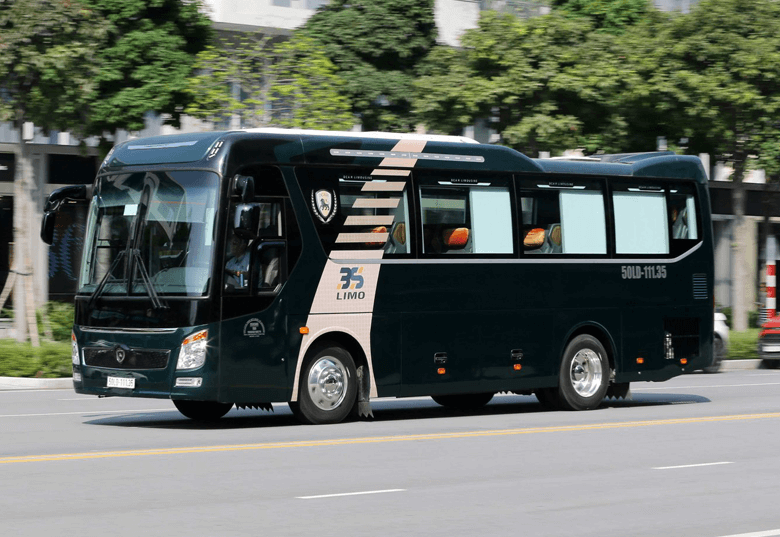
Most seated buses have air-conditioning and the staff on-board provides water and refreshing towels.
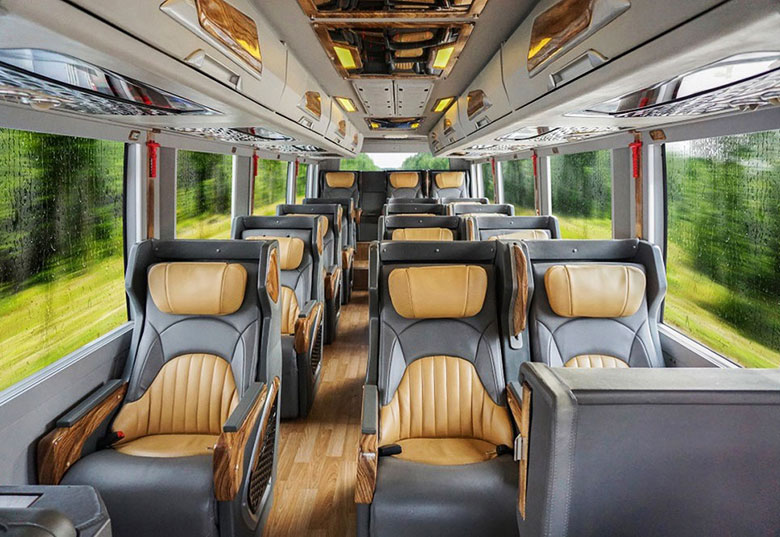
Sleeper buses
Sleeper buses generally cover long distances overnight and connect two or more cities in different provinces. Journeys can take up to 8 to 12 hours, so buses are prepared for passengers to sleep during most part of the journey.
The most common models of sleeper buses in Vietnam are double-deck coaches equipped with fixed berths and capacity for 30 to 40 passengers.
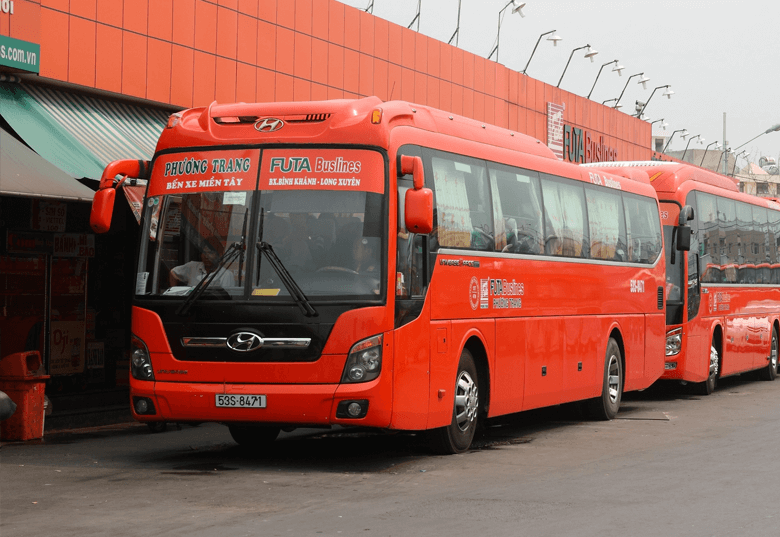
Most sleeper buses have air-conditioning and the staff on-board provides water, refreshing towels and sometimes blankets. Some modern buses are equipped with Wi-Fi internet and onboard entertainment system.
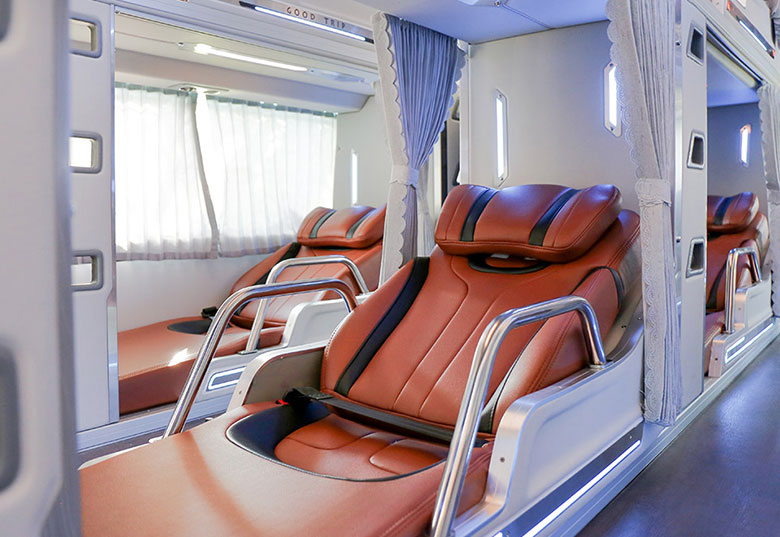
Minivans
Minivans generally cover short distances during daytime and connect cities in the same province or neighbor provinces. For short journeys of 1 to 3 hours companies operate minivans equipped with standard seats. For long journeys between 3 to 5 hours companies operate limousine vans equipped with upgraded seats designed to offer passengers a higher level of comfort.
The most common models of minivan in Vietnam are Ford Transit and Hyundai Solati, with the interior refurbished with three rows of seats accommodating 9 passengers, or one row of seats at the back and four individual seats in the center accommodating up to 7 passengers. Additionally, there is space for 1 extra passenger in the front of the van, seating next to the driver.
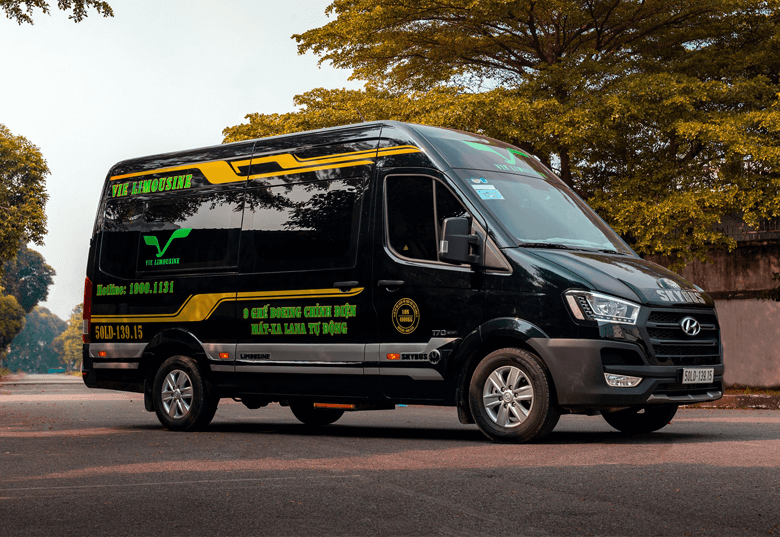
Most minivan vehicles are equipped with air conditioning, Wi-Fi internet, onboard entertainment system, reading light and USB phone charger to ensure a pleasant trip.
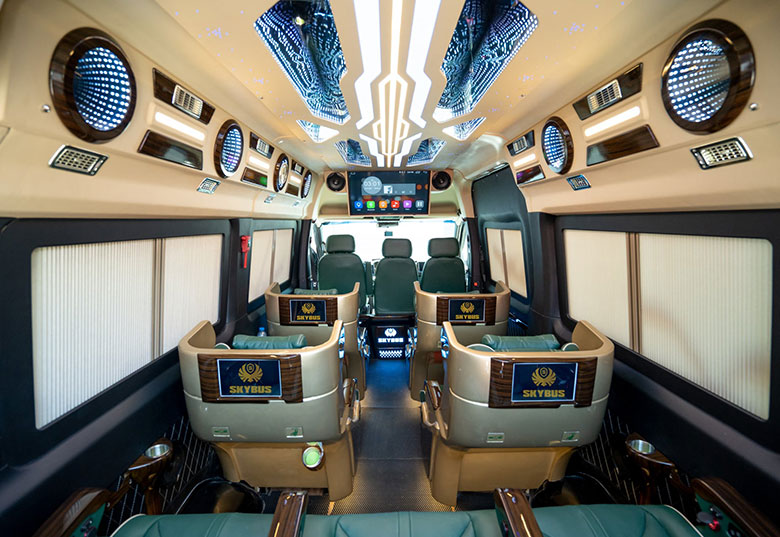
Getting around Vietnam by bus
Road transport conditions in Vietnam are rapidly improving with the construction of new expressways, although the main network still consists of national roads and provincial roads.
The National Route 1A traverses the country connecting Hanoi, Hue, Da Nang, Nha Trang, and Ho Chi Minh, meanwhile the new North-South Expressway runs parallel and is partially under construction.
The Hanoi–Hai Phong–Ha Long Expressway and Hanoi–Lao Cai Expressway were developed recently and have shortened the travel time from the capital to the mountains in the Northwest and the coast in the Northeast, whereas the Ho Chi Minh City–Trung Luong Expressway facilitates the access from the Southern metropolis to the Mekong Delta.
Northern Vietnam
Hanoi
The city of Hanoi offers an enchanting blend that combines traditional Vietnamese architecture, French colonial buildings and beautiful lake scenery. The capital is also the main transportation hub in Northern Vietnam with many buses and minivans departing from the main stations Gia Lam, Giap Bat, My Dinh and Nuoc Ngam, and the representative offices of the companies in Hoan Kiem District.
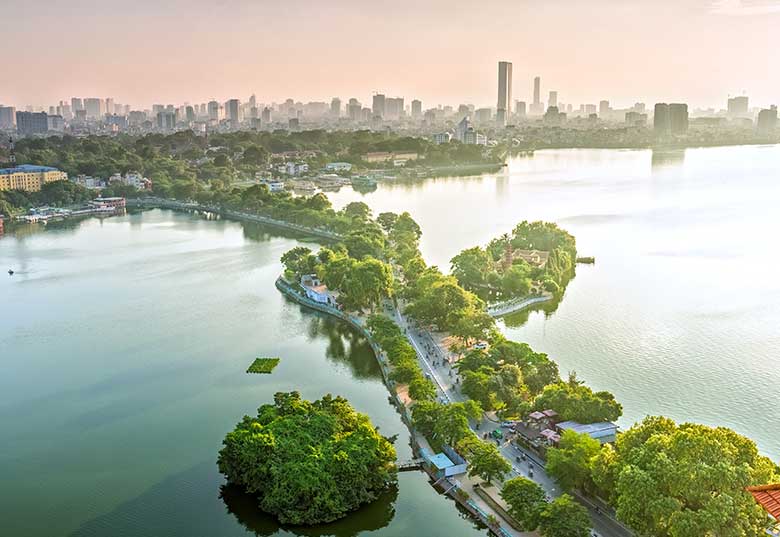
Bus routes to Hanoi
Northwestern Mountains
The Northwestern Mountains are characterized by amazing landscapes of impressive peaks and valleys of rice terraces and green tea fields, often inhabited by ethnic minority groups. We invite you to travel to Sapa in Lao Cai province, Mu Cang Chai in Yen Bai province and Moc Chau in Son La province.

Bus routes to Sapa

Bus routes to Moc Chau
Northern Mountains
The Northern Mountains are distinctive by having stunning steep mountain passes, switchback roads, and misty villages stuck in time that still preserve the traditional lifestyle. Get ready to discover the ultimate destinations in Northern Vietnam, Ha Giang, Tuyen Quang, Bac Kan, Cao Bang and Lang Son.

Bus routes to Ha Giang
Tours in Ha Giang

Bus routes to Cao Bang

Bus routes to Lang Son
Northeastern Coast
The Northeastearn Coast consists of the province of Quang Ninh and the city of Hai Phong. Travel here if you wish to explore the island of Cat Ba or cruise around Ha Long Bay, Lan Ha Bay and Bai Tu Long Bay, a coastal region formed by hundreds of limestone islands floating above the ocean, spectacular caves and secluded beaches.

Bus routes to Hai Phong

Bus routes to Cat Ba

Bus routes to Ha Long
Red River Delta
The Red River Delta is filled with charming old towns set in picturesque landscapes. Here you can visit temples and pagodas blended with the nature and cross through rice paddies while admiring breath-taking inland karst mountains. All this waits for you in Ninh Binh, Mai Chau in Hoa Binh province and Pu Luong in Thanh Hoa province.

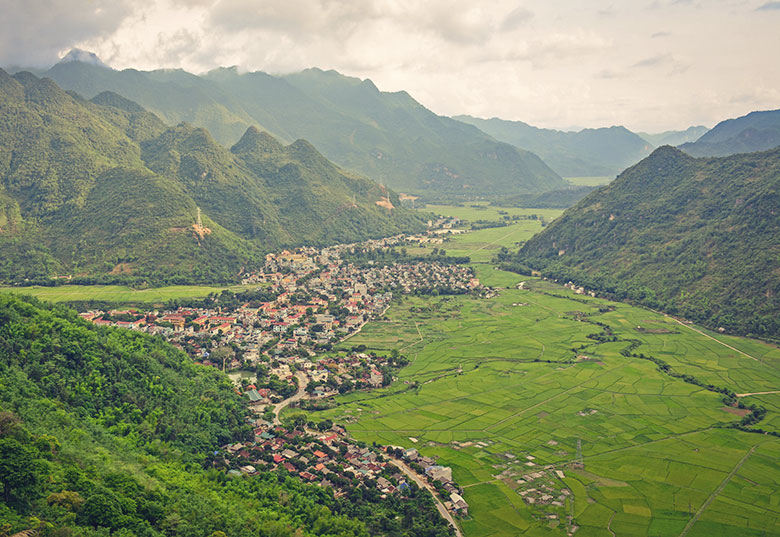
Bus routes to Mai Chau

Bus routes to Pu Luong
Central Vietnam
Central Vietnam comprises three regions, namely North Central Coast, South Central Coast and Central Highlands, as well as the cities of Hue, Da Nang and Hoi An.
North Central Coast
The North Central Coast is home to Phong Nha–Ke Bang National Park, a recently discovered natural marvel in Quang Binh province featuring some of the largest and most stunning caves in the world.

Bus routes to Phong Nha
Central Coast
The Central Coast is home to three major tourist destinations: Hue, recognized as World Heritage Site for its well-preserved monuments, including the Imperial City and the magnificent royal tombs of the former emperors of Vietnam; Da Nang, a popular holiday destination famed for its magnificent beaches and plenty of attractions, such as the Marble Mountains and Ba Na Hill Station; and the Ancient Town of Hoi An, one of the oldest Southeast Asian trading ports dating back from the 15th century that represents a good example of the fusion of Asian cultures.


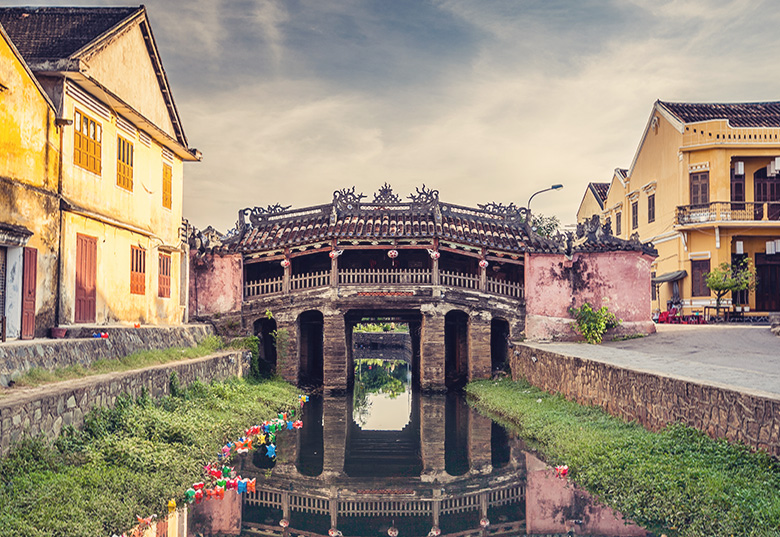
Bus routes to Hoi An

Bus routes to My Son
South Central Coast
The South Central Coast presents a diverse shoreline that varies from pristine sandy beaches to rocky cliffs. There are many top beach destinations along the coast of Quang Nam, Quang Ngai, Binh Dinh, Phu Yen, Khanh Hoa and Ninh Thuan provinces, with the seaside resorts of Quy Nhon, Tuy Hoa, Nha Trang and Phan Rang concentrating most of the tourism activity.
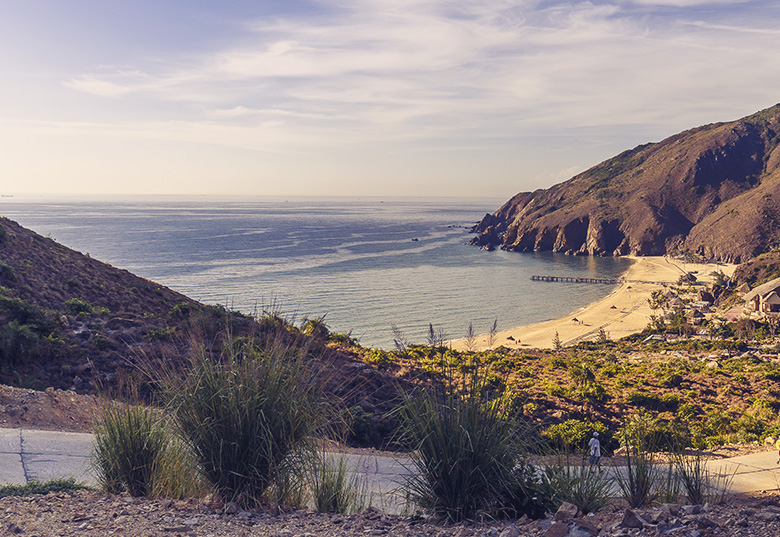

Bus routes to Tuy Hoa
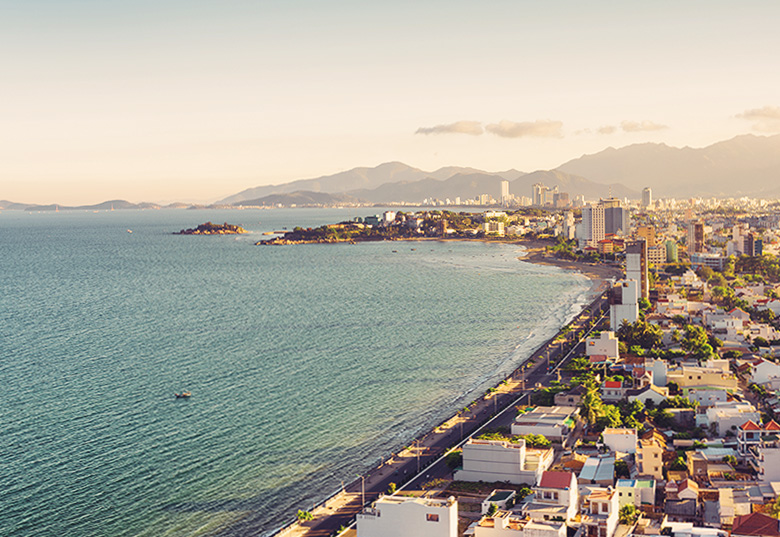
Central Highlands
The Central Highlands spans the provinces of Kon Tum, Gia Lai, Dak Lak, Lam Dong and Dak Nong. The region is famous for its beautiful scenery of lakes, waterfalls and hills covered by pine trees. Pleiku and Buon Ma Thuot offer the chance to get in touch with native tribe villages and learn about their cultural heritage. If you are looking for a romantic destination, the city of Da Lat will captivate your imagination with the image of french villas and colonial palaces immersed in misty valleys.

Bus routes to Buon Ma Thuot

Southern Vietnam
Ho Chi Minh
Located in the banks of Saigon river, Ho Chi Minh is a metropolis filled with war museums and bustling markets. The city is also the main transportation hub in Southern Vietnam with many buses and minivans departing from the main stations Mien Dong and Mien Tay, and the representative offices of the companies in Pham Ngu Lao and Ben Thanh wards of District 1.
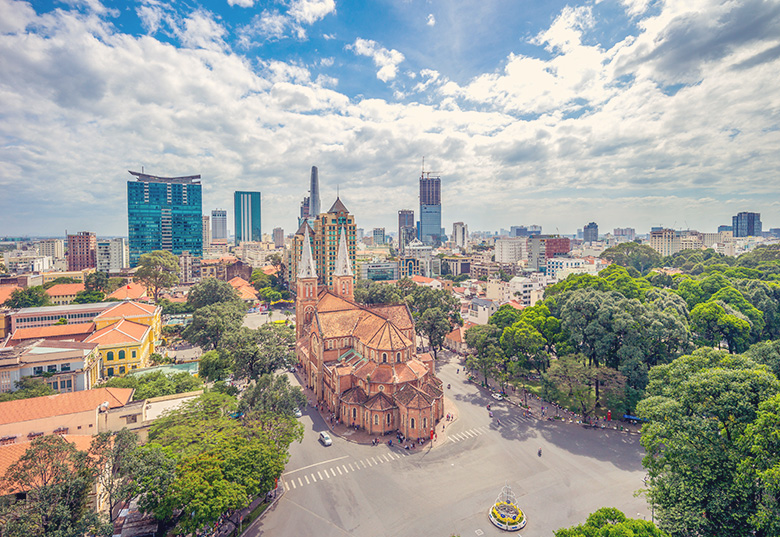
Southeastern Coast
The Southeastern Coast offers some getaway options to escape from Ho Chi Minh and embrace the peaceful atmosphere by the sea. Phan Thiet and Mui Ne are two coastal towns in Binh Thuan province renowned for their sand dunes and beaches, whereas Vung Tau is a seaport town with a french colonial past that features plenty of tourist attractions.

Bus routes to Phan Thiet and Mui Ne
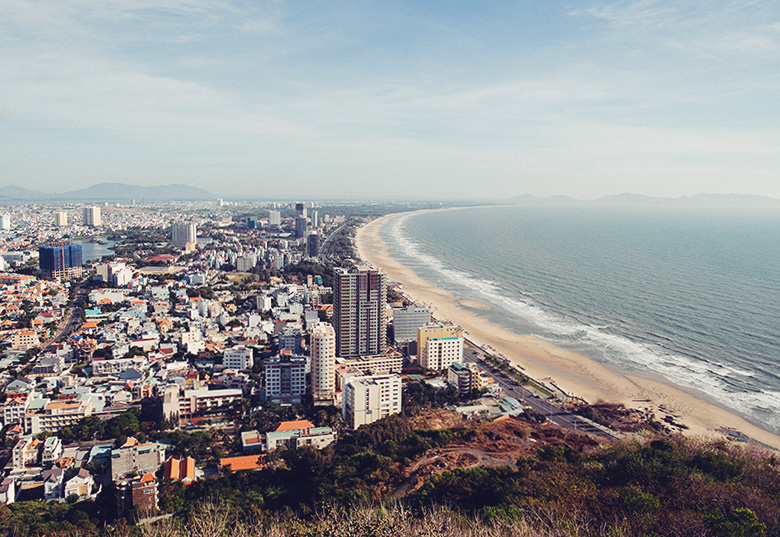
Bus routes to Vung Tau
Mekong River Delta
The Mekong Delta is a region of unique beauty with jungle and riverine canals best admired on board of a rowboat. My Tho, Ben Tre, Cai Be, Vinh Long and Sa Dec offer travellers the experience of navigating the water maze in the Mekong River; Can Tho is a must-stop spot to learn about the floating markets and visit the tropical fruit gardens; finally, Chau Doc contains the mystical Tra Su forest, a place only accessible by boat that looks extracted from a fairytale.
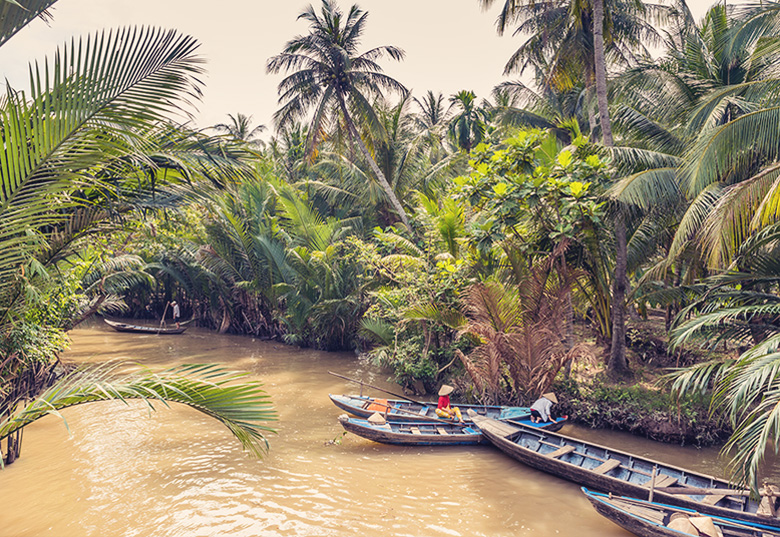
Bus routes to Sa Dec
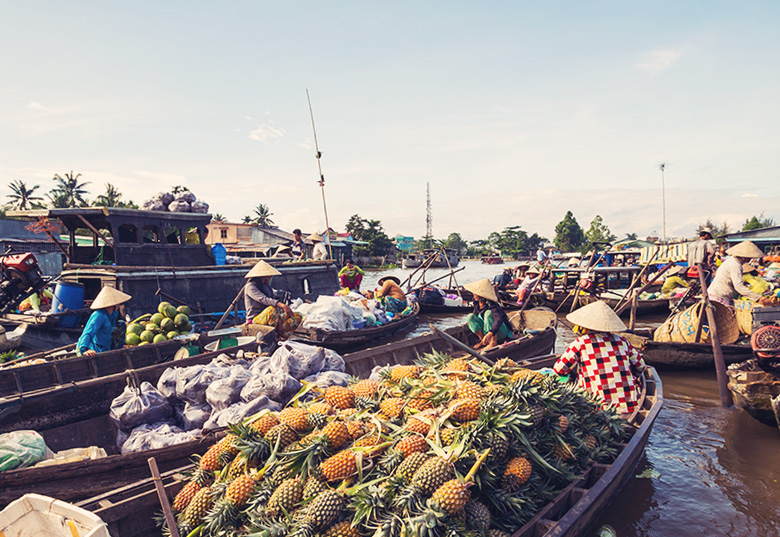

Bus routes to Chau Doc
Southern Coast
The Southern Coast comprises the provinces of Soc Trang, Bac Lieu, Ca Mau and Kieng Giang. From Soc Trang, travellers can catch a ferry to Con Dao archipelago. From Rach Gia and Ha Tien, travellers can catch a ferry to Phu Quoc and Nam Du islands.
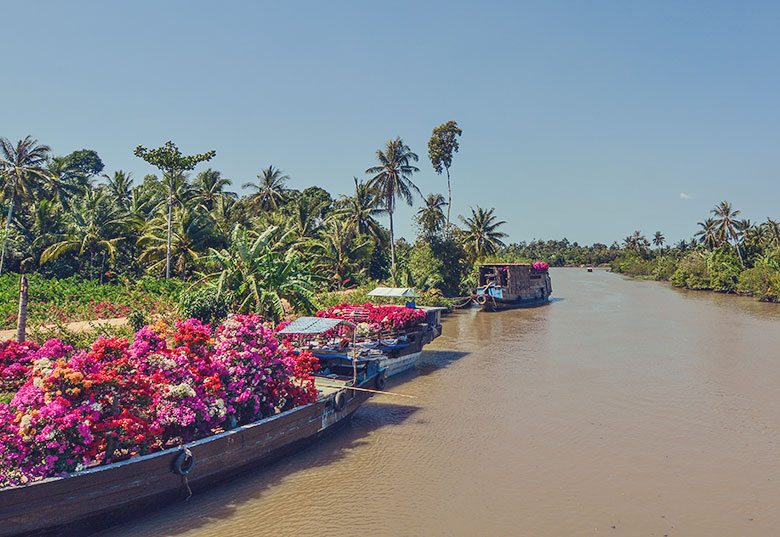
Bus routes to Soc Trang
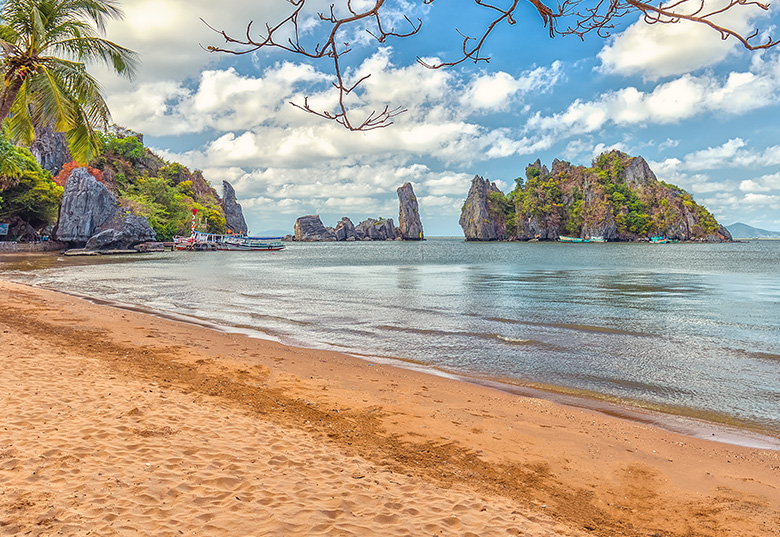
Bus routes to Rach Gia

Bus routes to Ha Tien
International bus routes to Vietnam
Vietnam is connected with direct international bus services to Phnom Penh in Cambodia.
Cambodia
Vietnam is connected by road with Cambodia through six border checkpoints: Le Thanh–O Yadao in Gia Lai province, Moc Bai–Bavet and Trapeang Phlong–Xa Mat in Tay Ninh province, Banteay Chakrei–Dinh Ba in Dong Thap province, Phnom Den–Tinh Bien in An Giang province and Ha Tien–Prek Chak in Kien Giang province.
Travellers bound to Vietnam are required visa exemption or else stamped visa or apply for e-visa or visa on-arrival.
International bus routes from Cambodia
How to book your bus tickets in Vietnam?
Booking your bus tickets in Vietnam is very quick and simple. Search for bus routes between any two cities for your travel dates.
Select your route
After search, we will display the results for your itinerary.
Find the services operated by different bus and minivan companies, and select the most convenient option.
Click to expand the details of the route, you will find the available fares. The bus companies in Vietnam offer various types of fares, depending if the service consists of a seating bus, a sleeper bus or a minivan.
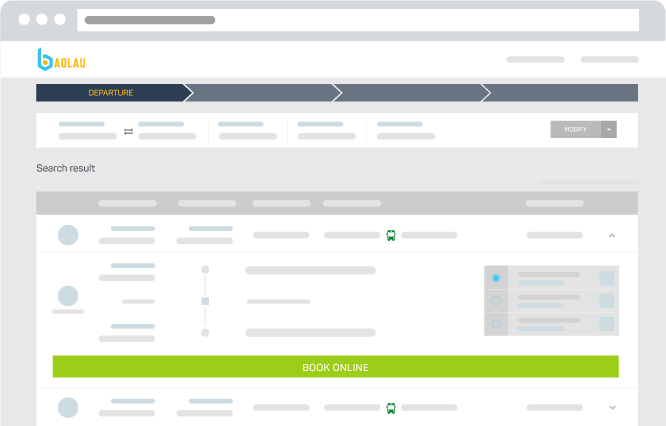
Fill in the passenger and contact details
Next, provide the passenger(s) information and select your seats.
Baolau supports seat selection on certain buses and minivans in Vietnam. In case that seat selection is available, you can choose your preferred seats during the reservation process and the seat numbers will be guaranteed when the booking is confirmed. In other cases, we will carefully select the best seats for you and your travel company.
Don't forget to provide the contact details of the person responsible for booking. We will send the ticket confirmation by email.
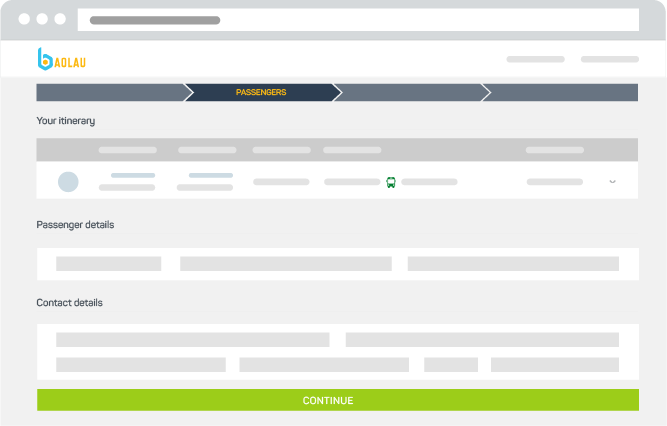
Complete your payment
Select your payment method. We accept international credit or debit cards.
Check your itinerary and price breakdown. Confirm that the booking information is correct. Before you proceed to payment, you must read and accept the terms and conditions of booking.
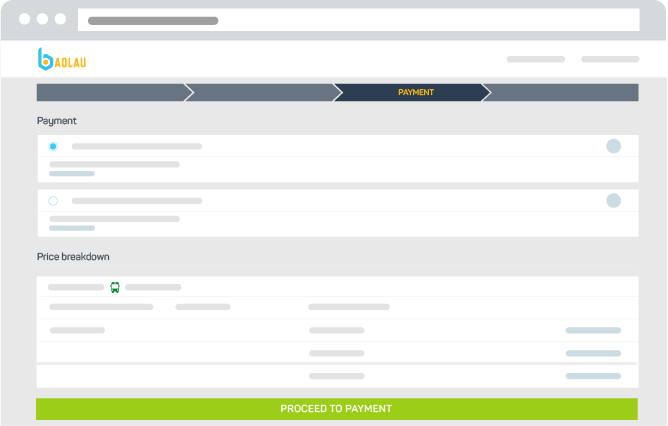
Receive your tickets by email
Once your payment is complete, your reservation will be processed.
In the following 24 hours you will receive the itinerary and booking confirmation by email with the electronic ticket in PDF format.

You can also access to Manage your booking via web and download the electronic ticket to your device.
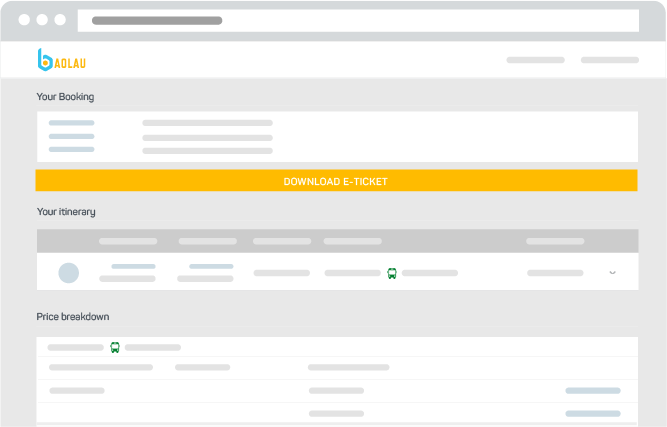
How to use the bus e-ticket?
The electronic ticket can be used to board the bus or collect the bus ticket at the authorized ticket office before boarding.
Passengers must follow the instructions contained in the e-ticket and print a physical copy in advance or carry a digital copy in the mobile phone to collect the ticket at the station or present the e-ticket at the time of boarding.

RECEIVE YOUR E-TICKET BY EMAIL
Receive your electronic ticket by email in PDF format, ready to print or carry in your mobile phone.

ARRIVE AT THE STATION ON TIME
Arrive at the bus station 60 minutes before the scheduled departure time. If required, present your electronic ticket at the authorized ticket office and collect your bus ticket.

BOARD THE BUS
Locate the bus departure point and present your ticket to the driver before boarding. Arrive on time, make sure you don’t miss your bus.


